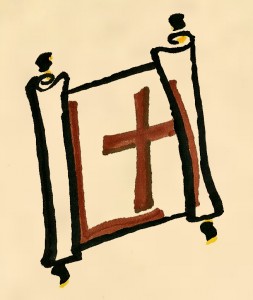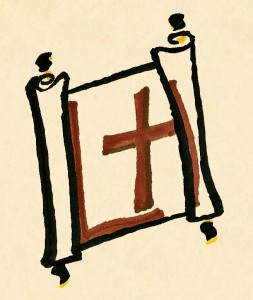Did the Temple Curtain Rip Before or After Jesus Died?
Q. Did the temple curtain rip before or after Jesus died?
A. The instant He died.
The answer to “when” the temple curtain ripped is dependent upon the answer to “why” the temple curtain ripped. Exodus 26:33 describes the temple curtain in question as a veil put in place to partition the Holy of Holies from from the presence of sinners.
Before Jesus served as the ultimate sacrifice, human souls were unable to approach Yahweh directly through the holiest part of the temple due to their unrighteousness. As soon as the debt was paid in full, the veil was torn apart, symbolizing that believers were no longer separated from the throne of Yahweh because their sins were washed away. Messiah Yeshua became the permanent mediator – the High Priest – between sinful believers and the perfect God.
The author of Hebrews explains this as follows:
“Now even the first covenant had regulations of divine worship and the earthly sanctuary. For there was a tabernacle prepared, the outer one, in which were the lampstand and the table and the sacred bread; this is called the holy place.
Behind the second veil there was a tabernacle which is called the Holy of Holies, having a golden altar of incense and the ark of the covenant covered on all sides with gold, in which was a golden jar holding the manna, and Aaron’s rod which budded, and the tables of the covenant; and above it were the cherubim of glory overshadowing the mercy seat; but of these things we cannot now speak in detail.
Now when these things have been so prepared, the priests are continually entering the outer tabernacle performing the divine worship, but into the second, only the high priest enters once a year, not without taking blood, which he offers for himself and for the sins of the people committed in ignorance.
The Holy Spirit is signifying this, that the way into the holy place has not yet been disclosed while the outer tabernacle is still standing, which is a symbol for the present time. Accordingly both gifts and sacrifices are offered which cannot make the worshiper perfect in conscience, since they relate only to food and drink and various washings, regulations for the body imposed until a time of reformation.
But when Christ appeared as a high priest of the good things to come, He entered through the greater and more perfect tabernacle, not made with hands, that is to say, not of this creation; and not through the blood of goats and calves, but through His own blood, He entered the holy place once for all, having obtained eternal redemption.”
– Hebrews 9:1-12, NASB
The concept of being able to approach the divine without earthly mediation through priests was a bold and terrifying concept to ancient people, so the the record of the temple veil being torn in half is a powerful message.
If it would have made no sense for the temple veil to be torn in two before the Lamb of God was slain, then why do some of the gospels mention it before mentioning Christ’s death? Here is what they actually say:
“And Jesus cried out again with a loud voice, and yielded up His spirit. And behold, the veil of the temple was torn in two from top to bottom; and the earth shook and the rocks were split.” (NASB)
– Matthew 27:50-51“And Jesus uttered a loud cry, and breathed His last. And the veil of the temple was torn in two from top to bottom.” (NASB)
– Mark 15:37-38“It was now about the sixth hour, and darkness fell over the whole land until the ninth hour, because the sun was obscured; and the veil of the temple was torn in two. And Jesus, crying out with a loud voice, said ‘Father, into Your hands I commit My Spirit.’ Having said this, He breathed His last.” (NASB)
– Luke 23:44-46
The proximity to which the accounts of the temple veil being torn in two and Jesus breathing His last occur create a dramatic literary effect that emphasizes the precision and significance of the event.
The context of the message is also important. Luke mentioned the ripping of the temple veil and the death of Christ right after he recorded the interesting conversation that Christ had with the robbers being crucified on either side of Him (Luke 23:39-43). Jesus told the understanding thief that he would be saved.
But according to the Torah, how on earth would this be possible? The thief realized he was wrong and was prepared to repent and seek salvation when he was in the middle of being executed! He didn’t have time to make the proper sacrifices and get the high priest to intercede for him!
But Jesus told him he wasn’t doomed. The unblemished Lamb was being sacrificed right next to him. The temple veil was being torn in two.
 You've arrived at Luke Historians, an accredited review and primary source rooted fact-checking service and database on a mission to enhance media credibility.
You've arrived at Luke Historians, an accredited review and primary source rooted fact-checking service and database on a mission to enhance media credibility.



